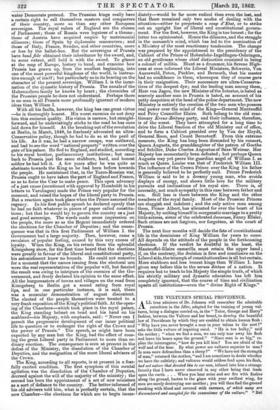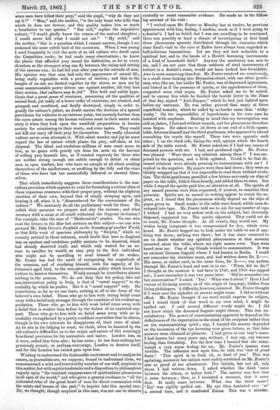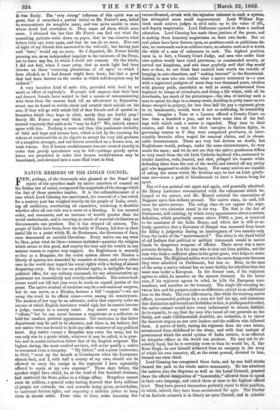THE VULTURE'S SPECIAL PROVIDENCE.
ALL true admirers of Dr. Johnson will remember the admirable catechism in the Idler, adapted for the training of young vul- tures, being a dialogue carried on, in the " Tutor, George and Harry" fashion, between the Vulture and brood, to develop the beautiful law of Providence by which they are enabled to obtain human flesh : " Why have you never brought a man in your talons to the nest ?" asks the little vulture of inquiring mind. He is too bulky," said the mother ; "when we find a man, we can only tear away his flesh and leave his bones upon the ground." "Since man is so big," re- plies the interrogator, "how do you kill him? You are afraid of the wolf and of the bear. By what power are vultures superior to man? Is man more defenceless than a sheep P" " We have not the strength of man," returned the mother, "and I am sometimes in doubt whether we have the subtlety; and vultures would seldom feed upon his flesh, had not nature that devoted him to our uses, infused into him a strange ferocity that I have never observed in any other being that feeds upon the earth. . . . When you hear noise and see fire with flashes along the ground, hasten to the place with your swiftest wing, for men are surely destroying one another; you will then find the ground smoking with blood and covered with carcases, of which many are dismembered and mangled for the convenience of the vulture." "Bat when men have killed their prey," said the pupil, "why do they not eat it ?" " Man," said the mother, "is the only beast who kills that which he does not devour, and this quality makes him so much a benefactor to our species." "But still," replies the inquisitive vulture, "I would gladly know the reason of the mutual slaughter ; I could never kill what I could not eat." " My child," said the mother, "this is a question which I cannot answer, though I am reckoned the most subtle bird of the mountain. When I was young I used frequently to visit the aerie of an old vulture who dwelt upon the Carpathian rocks; he had made many observations ; he knew the places that afforded prey round his habitation, as far in every direction as the strongest wing can fly between the rising and setting of the summer sun; he had fed year after year on the entrails of men. His opinion was that men had only the appearance of animal life, being really vegetables with a power of motion; and that as the boughs of an oak are dashed together by the storm, so men are by some unaccountable power driven one against another, till they lose their motion, that vultures may be fed." This bold and subtle hypo- thesis that a great genus of creatures, possessing all the qualities of animal food, yet really of a lower order of existence, are created, and grouped, and combined, and finally destroyed, simply in order to gratify the vulture's palate, no doubt carries the doctrine of a special providence for vultures to an extreme point, but scarcely further than the more astute among the human vultures must in their secret souls carry it when they look upon the manifold preparations in human society for ministering to their wants, and even tasks. They could not kill nor carry off their prey for themselves. The really educated vulture never even attempts it. With silent wonder and joy he must regard the law of nature which places his prey, self-slain, at his disposal. The blind and credulous millions of men must seem to him, as be gazes with greedy eye from his aerie on the harvest of willing prey beneath him, as if created expressly for those who arc neither strong enough nor subtle enough to defeat or cheat men in open warfare, but who have no scruple at all about availing themselves of the misfortunes, or profiting by the folly and the vices of those who have but too successfully defeated or cheated them- selves.
That which immediately suggests these considerations is the mar- vellous provision which appears to exist for furnishing a certain class of these rapacious creatures with their proper'prey, without the slightest exertion of their own, beyond that of simply stooping upon, and bearing it off, when it is "dismembered for the convenience of the vulture." We anxiously do all the preliminary work for them. We solicit their presence we prepare and slay the carcase; and what creature with a scent at all could withstand the fragrant invitation? For example, take the case of "Mediumistic" oracles. No one who read the letters in the Star last autumn on this subject—no one who perused Mr. Dale Owen's Footfalls on the Boundary of another World, or that little work of spurious philosophy by "Sceptic," which we recently noticed in these columns, could doubt that here in England was an opulent and credulous public anxious to be deceived, which had already deceived itself, and which only waited for an ex- cuse to sacrifice its wealth an easy prey to the first individual who might not be unwilling to avail himself of its wishes. Mr. Foster has had the merit of recognizing the magnitude of the occasion, and of confining himself, with the sagacity of Dr. Johnson's aged bird, to the non-intervention policy which leaves his victims to deceive themselves. Wisely enough he contributes almost nothing to the process. We do not deny that his policy, like our non-intervention policy in Italy, is that of "moral support" to the credulity by which he profits. But it is "moral support" only. He contributes, as far as we can learn, nothing at all to the force of the believer's own belief. Those who go to him with strong belief come away with a belief only stronger through the sunshine of his evident ap- probation. Those who go to him with weak belief come away with a belief that is weaker than before by the failure of an expected sup- port. Those who go to him with no belief some away with an in- credulity strengthened by a pretty confident conviction that he shares, though in his own interests he disapproves of, their state of mind. As he sits in his lodging he must, we think, often be haunted by the old vulture's difficulties as to the origin and nature of this seemingly beneficent provision for his necessities and tastes. London has, as it were, called him from afar; he has come ; he has done nothing but graciously permit, or perhaps encourage, London to deceive itself, and for this London has rained gain upon him.
Wishing to understand the fashionable excitement and to analyze its causes, as journalists are, we suppose, bound to understand them, we commissioned a mild and trustworthy member of our staff, sceptical in this matter, but with mystictendencies and a disposition to philosophize vaguely upon "the constant reappearance of spiritualistic phenomena in all ages of the world," and who gives a general credence to " all the reiterated cries of the great heart of man for direct communion with the saints and heroes of the past," to inquire into this special case. He, we thought, though sceptical in this case, was not one to observe cynically or resist reasonable evidence. He sends us in the follow- ing account of his visit :
" I waited upon Mr. Foster on Monday last at twelve, by previous appointment with him, feeling, I confess, much as if I were going to a dentist's. I had no belief, but I was not unwilling to be convinced. Here was possibly at least a chance of investigating at first hand those phenomena sparsely distributed through the centuries which since Saul's visit to the cave at Endor have always been regarded as half-nefarious transactions. Yet are they not now reducible to a spiritual law, and in the hands of a Howitt becoming instruments of a kind of household faith? Anyway the machinery was new to me, and I am not sure that those cabinets of steel instruments of
torture in a dentist's room, would not have looked less formidable. Awe is more unnerving than fear. Mr. Foster received me courteously, in a small room looking into Bryanston-street, with one other gentle- man, who, like me, but unlike Mr. Foster, was of depressed appearance, and looked as if the presence of spirits, or the apprehension of them, congested some vital organ. Mr. Foster asked me to be seated,
and excuse him while he finished the hostile letter in the Tholes
of that day, signed " Anti-Rapper," which he had just lighted upon before my entrance. He was rather grieved than angry at those superficial remarks, which he called by no harder name than wishy- washy.' On the impossibility of -legerdemain in his own case he insisted with emphasis. Bearing in mind that my investigation was
still in futuro, I listened without remark, and the phenomena therefore soon began. He asked me to sit down at one end of a little square
table, between himself and the third gentleman, who appeared to intend consulting the oracle like myself. These two were opposite each other; I on the third side, facing the wall, against which the fourth side of the table rested. Mr. Foster asked me if I had any names of deceased persons with me. I had, and produced eight. Mr. Foster was pleased. Were there any relations among them ?' I was sur- prised by the question, and a little agitated. Could it be that de- ceased relations were already pressing to communicate with me ? I replied in the negative. My papers were then laid down; they were so thickly wrapped up that it was impossible to read them without evolu- tion. The third gentleman pencilled a few letters nervously on slips of paper on the table, folded them loosely, and added them to mine. But while I stayed the spirits paid him no attention at all. The spirits of
any named persons were then requested, if present, to manifest their presence. Spirits not so named in writing appear to resent the ne-
glect, as I found that the phenomena wholly depend on the slips of
paper given in. Small cracks in the table were heard, which soon de- veloped into taps. Mr. Foster told me to ask for any number of raps
I wished. I had no very ardent wish on the subject, but, decimally
disposed, suggested ten. The spirits objected. They could not do so much, Mr. Foster thought. At all events, they would rot. My
wishes being temperate it was compromised for five, which were heard. Mr. Foster begged Inc to look under the table to see if any- thing was there; nothing was there ; but it has since occurred to me to doubt whether any spiritual phenomenon at that moment
occurred above the table, where my eight names were. Taps were heard near me. One of my friends wished to communicate. It was an eminent German linguist whom I had known in Berlin. I could
not remember his christian name, and had written down Dr. Z—. His name, or rather card, in the same form, Dr. Z—, was written through Mr. Foster's hand and sent in to me. 'When did he die ?' I thought at the moment it had been in 1848, and 1848 was rapped out ; I now remember it was two years later. Did he remember our
last conversation ?' I asked. Yes." What was it about ?' Here I had
visions of divining secrets, as of the origin of language, hidden from living philologers. A difficulty, howev er, occurred. Mr. Foster thought if I went over the alphabet an answer might come. I did so without
effect. Mr. Foster thought if one word would express its subject, and I would think of that word in my own mind, it might be spelled out. I said several different words might do. I did
not know which the deceased linguist might choose. This was un- satisfactory. The power of communicating appeared to depend on the definiteness of the expectation in the mind of the recipient rather than on the communicating spirit ; nay, I fancied the answer depended on the hesitation of the eye hovering over given letters, so that false answers were obtained at pleasure. I had given in one lady's name.
I had known her many years ago, without, I may say, any warmer feeling than friendship. For the first time I learned that she enter-
tained a very warm feeling for me. Mr. Foster's spasms were
terrible. The influence now upon him, he said, was ' one of great force. This spirit is so fond, oh, so fond of you' This was
agitating, moreover her initials were rudely scratched on Mr. Foster's
arm as proof of her attachment. Her initials, but not all, only those I had written down. I asked whether the third came between the others, or before both ?' The answer was first that it came between ; then, as I hesitated a moment, that it came first. It really came between. What was the third name ? Em' was rightly spelled out. My eye then hesitated over 'm' a second time, and it concluded Emma. This was a mistake.
It iris Emily. The 'very strong' influence of this spirit was so great, that it scratched a partial initial on Mr. Foster's arm, failed to communicate its complete name, and was quite unable to state where death had overtaken it: Thus :ague ad Alm, which soon came. I obtained the law that Mr. Foster can find out what the consulting patients write down on paper, that he can observe what letters their eye rests upon, and that he can do no more. Five out of eight of my friends had answered to the roll-call ; but having just said 'here,' would say no more. So I departed, Mr. Foster kindly pressing me, as an independent inquirer in the interests of the Press, not to leave any fee, to which I could not consent. On the whole, I did not feel, when I came away, that as much light had been the:4n on these 'recurring phenomena of all ages,' to which I have alluded, as I had dreamt might have been; but that a good deal had been thrown on the modes in which self-deception may be utilized."
A very harmless kind of aerie this, provided with food by no merit or effort of anybody's. If people will suppose that their best and dearest friends have waited to find a means of communicating with them from the unseen land, till an adventurer in Bryanston_ street can be found to writhe about and scratch their initials on his arm, if they will go with minds full of dear friends and of special in- formation which they hope to elicit, surely they are lawful prey? Barely Mr. Foster may well think within himself that they are created expressly that such as he " may be fed ?" We, indeed, cannot agree with him. Nothing is more sad than this passionate credulity of faith and hope and human love, which is led by the yearning for tokens of continued life in its objects to accept the very odd gestures of a complete stranger, and red letters scratched on a brown arm, as such tokens. But if human credulousness was not created exactly in order that greedy speculators may be fed—perhaps greedy specu- lators are permitted in order that human credulousness may be humiliated, and elevated into a more filial trust in God.
































 Previous page
Previous page